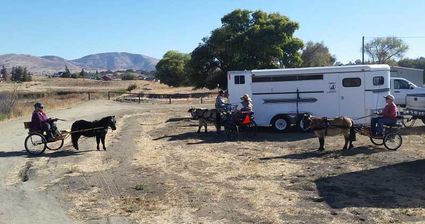BVS Carriage & Driving Society newsletter August 2017
Do you know which plant is so toxic that horses which have died from eating it have been found with the leaves still in their mouths? This is how Erika Williams started her presentation to the Carriage Club members at their July meeting. The answer is Oleander, and I am happy to report that we could answer correctly.
This was an example of the kinds of questions that Erika faced at the recent Pony Club Kentucky Quiz Championships. A couple of months ago Gary Yettner and Debbie Swarens gave a presentation to the Carriage Club about the BVS Pony Club which is a section of the United States Pony Club. They told us that Erika Williams, one of the BVS Pony Club members, had qualified for the Pony Club Kentucky Quiz Championships. This is a very big deal as there are competitors from all across the USA that vie for a place in these finals. The Carriage Club was pleased to make a donation to the BVS Pony Club to support Erika in her efforts.
It gives us great pleasure to announce that, not only did the team she was a part of succeed in winning 13th place out of 41 teams, but Erika went on to win the Blue Ribbon for Individual First Place! Hearty congratulations to Erika for winning these awards. She has put Bear Valley Springs firmly on the map with the US Pony Club.
Erika told us about her adventures in Kentucky and showed us her medals. She thanked the Carriage Club for their donation, as well as acknowledging all the people who had helped her achieve this success. The Club members thoroughly enjoyed her presentation. Erika is a hardworking, talented young lady who spoke with confidence and poise. She certainly earned her triumph as she has been studying diligently for the last couple of years in preparation for the Quiz. Her thanks were also demonstrated by the fact that she handcrafted a 'Thank You' card for the Club members. It seems that the efforts of the Pony Club mentors, such as Gary and Debbie, are achieving the aims of the Pony Club to "develop character, leadership, confidence and a sense of community in youth through a program that teaches the care of horses and ponies, riding and mounted sports."
Next up was Terri Stor who spoke about her adventures with driving, particularly minis. Terri has kept and driven minis for decades. She has a wealth of experience which she shared with us. She covered a wide range of aspects of driving minis as well as facets of their husbandry. We learned that, although minis are basically the same as their larger equine relatives, there are differences that are significant enough to warrant slightly altered husbandry.

Many of these alterations stem from the fact that they are physically smaller than other equines. For example, because their digestive system is smaller than larger equines, they are slightly more prone to impaction colic. Also, having more petite teeth and jaw muscles than their bigger relatives, they do not have the strength to properly masticate coarse food such as feed straw.
Another fascinating fact is that, like cats, minis are prone to hair balls! This is due to the fact that minis are descended from Shetland ponies, a native breed of very small horse that hales from the Shetland Isles of Scotland. As trees are few and far between on the islands, there is not much shelter so they grow a very thick, shaggy coat to protect them from the harsh climatic conditions. Terri has found a very effective way of mitigating that problem and avoiding hair balls – that is to feed the minis with papaya! Although this seems an extraordinary remedy, she has found that it is highly effective.
There were many questions for her from interested and curious members of the audience. Thank you, Terri, for sharing your expertise and fund of knowledge with us.




